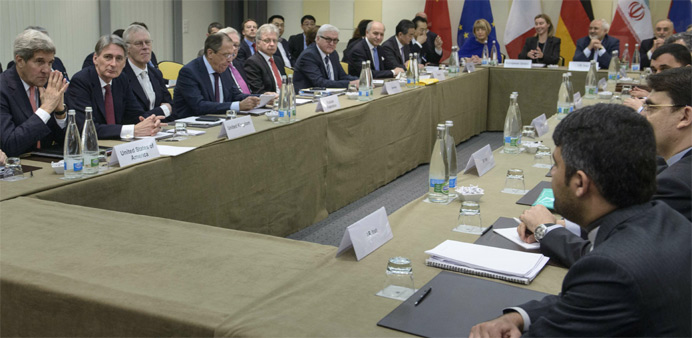AFP/ Lausanne
Foreign ministers from major powers pressed their Iranian counterpart on Monday as they sought to slot into place the final but also the trickiest pieces of a deal curtailing Tehran's nuclear programme as Tuesday's deadline loomed.
Britain's Philip Hammond said as he became the last of the foreign ministers to arrive in a rainy Switzerland that they "believe a deal can be done".
"But it has to be a deal which puts the bomb beyond Iran's reach," he said.
With time of the essence, US Secretary of State John Kerry, Iranian Foreign Minister Mohammad Javad Zarif, Hammond and the top diplomats of Russia, China, France and Germany are meeting for the first time since November.
They have set a deadline of midnight on Tuesday to agree the outlines of a deal that they hope will put an Iranian nuclear bomb out of reach and end a crisis that has threatened to escalate dangerously for the past 12 years.
German Foreign Minister Frank-Walter Steinmeier said that after 18 months of negotiations, they were in the "endgame". Iran's lead negotiator Abbas Aragchi said they were in the "final phase".
But Aragchi also said the talks were "very difficult" while Steinmeier cautioned that the "final metres are the most difficult".
The framework deal, if it can be hammered out, is meant to be finalised by June 30. But opponents have already been lining up to say it stops short of ensuring Iran does not get the bomb.
These include US President Barack Obama's Republican opponents and Israeli Prime Minister Benjamin Netanyahu, who on Sunday launched a blistering attack on the "dangerous" deal.
"I just don't understand why we would sign an agreement with a group of people who in my opinion have no intention of keeping their word," US House Speaker John Boehner told CNN.
Israel is widely believed to be the sole, if undeclared, nuclear-armed power in the Middle East.
- Jigsaw puzzle -
Western diplomats say that some areas in what would be a highly complex jigsaw puzzle of an accord are tentatively ready to be put into place. But they caution there is a long way to go.
One Western diplomat said Iran had "more or less" agreed to slash the number of its centrifuge enrichment machines from 20,000 to 6,000 and to ship abroad most of its stockpile of low-enriched uranium.
This would make it a much more lengthy process to further purify these stocks to weapons-grade, were Iran to attempt to do so. Iran denies having any such aim, saying its programme is purely peaceful.
Iranian officials dismissed the numbers as "speculation", with Aragchi saying ruling out sending the stocks abroad, although he said "other options" were being examined.
"We have almost come to a solution, but it is out of the question to send the stocks abroad," Aragchi said.
This could include diluting the low-enriched uranium or converting it to another form.
But nevertheless Iranian officials have expressed guarded optimism that a breakthrough may be at hand.
"Getting to an accord is doable. Solutions have been found for numerous questions. We are still working on two or three issues," Aragchi said.
In addition to scaling down its nuclear programme, the powers want the facilities that remain to be subject to an unprecedented level of inspections by the UN atomic watchdog to ensure there is no cheating.
Its underground facility at Fordo would also likely be barred from uranium enrichment, diplomats said, although it might be kept open for research purposes.
One of the thorniest issues is the lifting of UN, EU and US sanctions that have choked Iran's economy by strangling its oil exports and banks.
Aragchi said Sunday there must be a "precise framework" for lifting sanctions. The duration of any deal -- the US wants at least 10 and possibly up to 15 years -- is also a point of contention.
"There are six (UN Security Council) resolutions that have to be annulled," Aragchi said.
But a senior US official said all sides had agreed to a phased, step-by-step approach, although the exact formula had yet to be found.
Another difficult area is possible limits Iran's research and development of newer, faster centrifuges, which would in theory enable it to make material for a weapon much more quickly.

